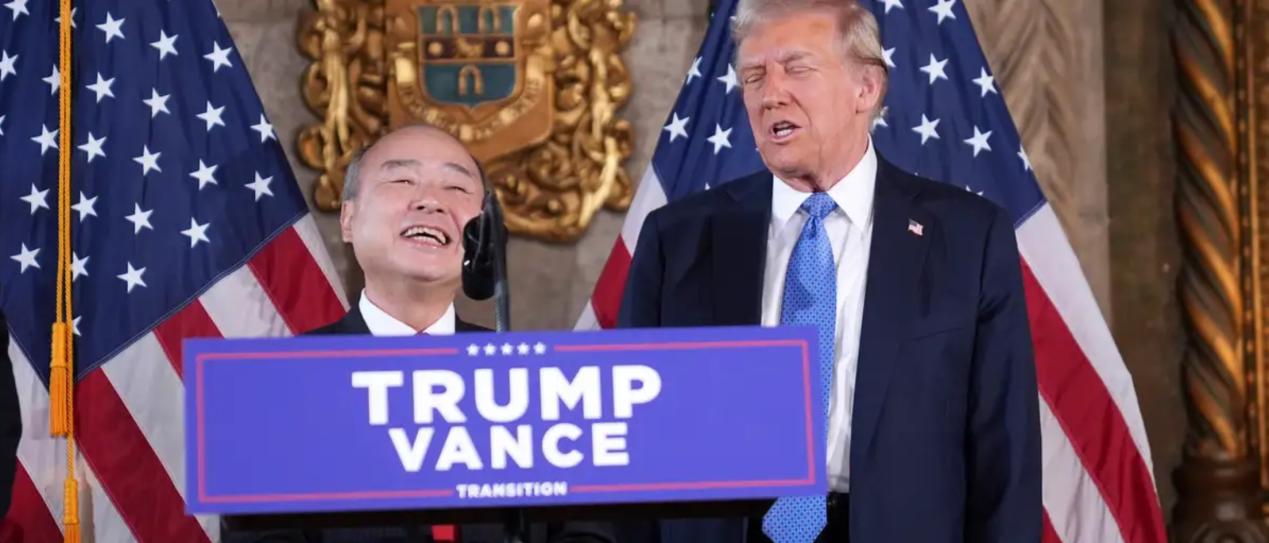
Recently, the incoming US President Trump announced a shocking economic news: Japanese SoftBank Group will invest $100 billion in the US. This huge investment plan has caused a strong shock in the global economic circle and has become the focus of attention. Why would tech giant SoftBank choose to make such a large investment in the US?
Firstly, SoftBank's investment reflects its positive expectations for the US economic recovery. In the context of increasing economic uncertainty globally, as the world's largest economy, the US market size, consumption capacity and innovation environment still have strong appeal for investors. SoftBank expects to benefit from the US economy's continued growth and inject capital into it to promote further recovery. During his campaign, Trump promised to boost the US economy by cutting corporate taxes and using tariffs to stimulate foreign companies to invest in the US. This provided favorable policy expectations for SoftBank's investment decision.
Secondly, SoftBank is optimistic about the development potential of the US technology sector, especially in the field of artificial intelligence. SoftBank Group CEO Masayoshi Son has repeatedly expressed optimism about artificial intelligence, believing that it is a technology that will change most industries. The $100 billion investment in the US is likely to focus on AI-related investments such as data centers aimed at AI development. This shows that SoftBank believes there is huge development potential for AI in the US and that investing in this field can bring long-term substantial returns. The US has leading advantages in research and development, talent reserves, and market application, and SoftBank's investment will help it establish closer cooperative relationships with US tech companies and innovative forces, thereby enhancing its position in the global technology and industrial chain.
From a strategic perspective, SoftBank's move further enhances its global technology portfolio. By investing in AI and related infrastructure in the US, SoftBank can deepen its participation in US economic activities and share the benefits of US economic growth. Meanwhile, this investment also helps SoftBank diversify risks and reduce its dependence on a single country or regional market, enhancing its resilience to economic fluctuations globally.
SoftBank's own financial situation and investment strategy adjustment are also important factors for this investment. Although SoftBank does not have $100 billion in cash on hand, its latest financial report shows that the SoftBank Group has about $29 billion in cash and cash equivalents, plus its holdings in chipmaker ARM Holdings and other assets, as well as its Vision Fund and other available funds, enabling it to prepare the necessary funds for this investment. Furthermore, SoftBank has suffered losses from some of its investments in startups, such as its investment in office space company WeWork. Increasing investment in the US, especially in emerging technologies such as AI, reflects SoftBank's investment strategy adjustment and shift from traditional or higher-risk investment projects to more promising and prospective technology areas in order to seek more stable and sustainable investment returns.
Geopolitical factors also played a role in SoftBank's investment decisions. The US and Japan have a long-term alliance relationship, and economic cooperation is an important support for this alliance relationship. To some extent, SoftBank's investments reflect the mutual support and cooperation between the two countries in economic terms, which has certain significance in consolidating their alliance relationship, maintaining regional economic stability and so on. In addition, by announcing this huge investment plan, SoftBank not only expressed support for the Trump administration, but also expected to obtain more policy preferences, business opportunities, and government resources support in the future.
However, this investment plan is not without risks and challenges. The policy environment, market competition, etc. in the US are uncertain. The US government's policy changes may have an adverse impact on investment projects, such as tax policy and regulatory policy adjustments. At the same time, the US market is highly competitive, and whether SoftBank's investment projects can stand out from the many competitors and achieve expected returns still has a lot of uncertainty.
In summary, behind SoftBank's investment of hundreds of billions of dollars in the United States, there are positive expectations for the U.S. economic recovery and favorable policies, and recognition of the development potential of artificial intelligence and other scientific and technological fields, as well as various considerations such as improving the global strategic layout, diversification of investment risks and geopolitics. This investment plan not only relates to the economic direction of the two countries, but also lays an important foreshadowed in the reshaping of the global economic pattern. However, the opportunities and challenges also need to be carefully examined and addressed by all parties

The U.S. third-quarter GDP growth rate, strikingly highlighted at 4.3%, not only surpassed market expectations but also earned the label of "the fastest in two years."
The U.S. third-quarter GDP growth rate, strikingly highligh…
Recently, US personnel intercepted a "Century" super oil ta…
According to Xinhua News Agency, the subtle changes in the …
The rapid development of artificial intelligence has brough…
In December 2025, Taiwan's political scene was shaken by a …
When Apple appears for the Nth time on the list of penaltie…